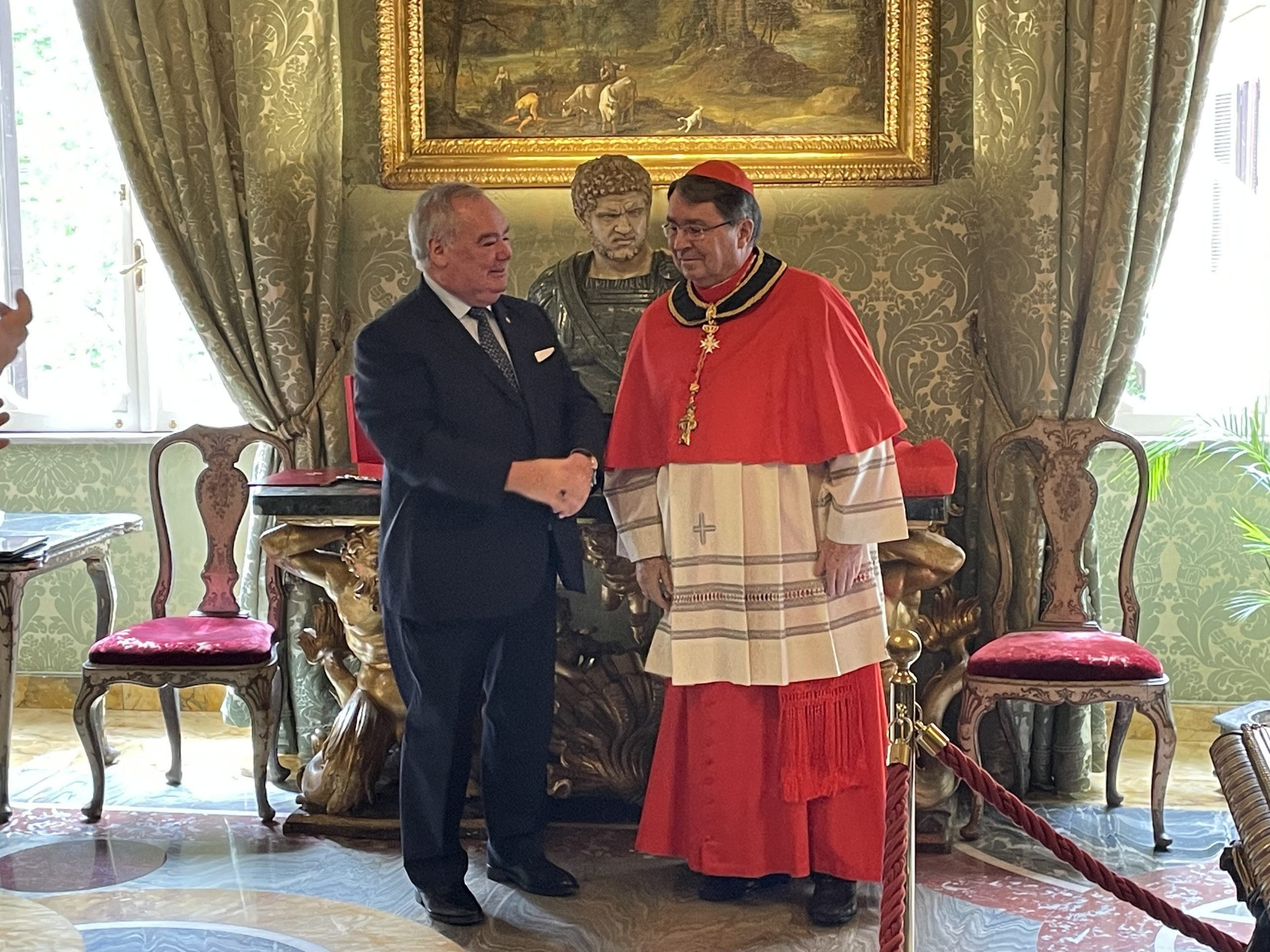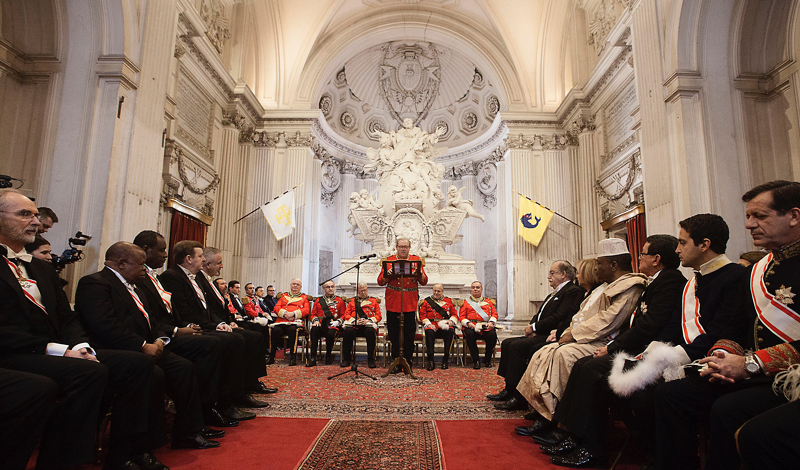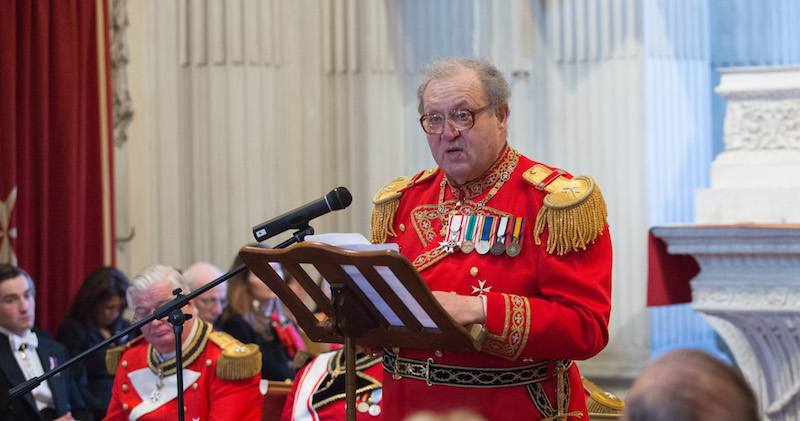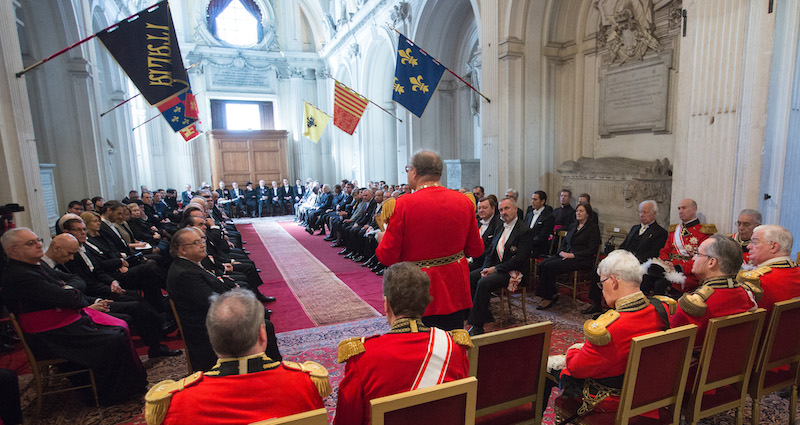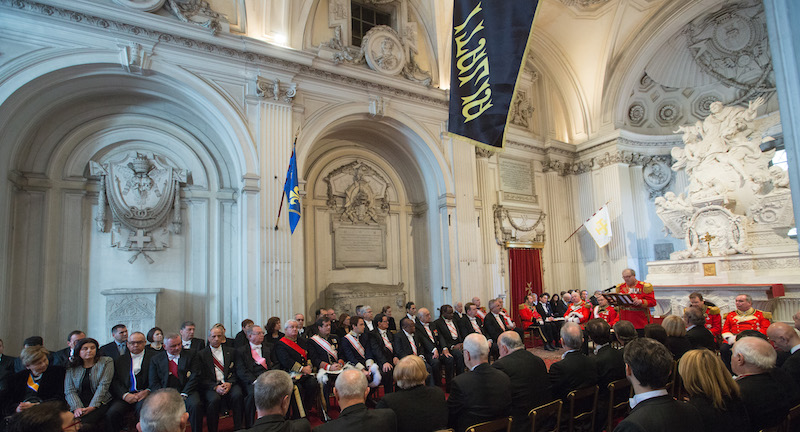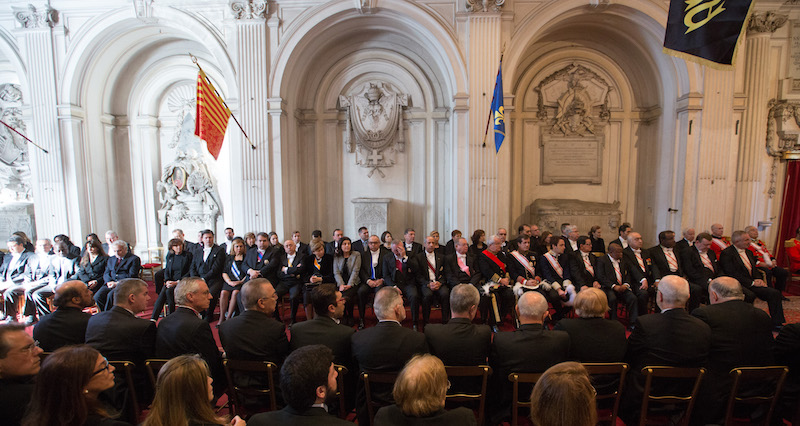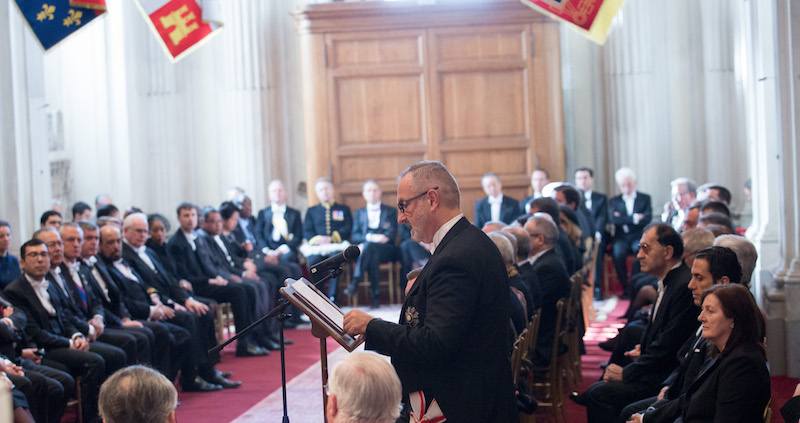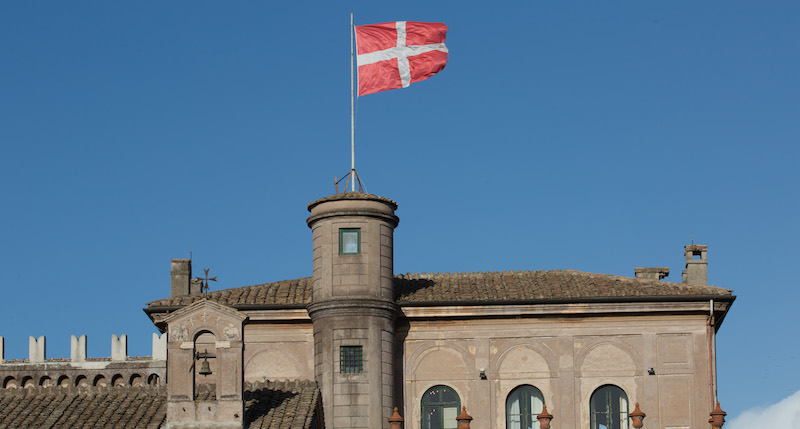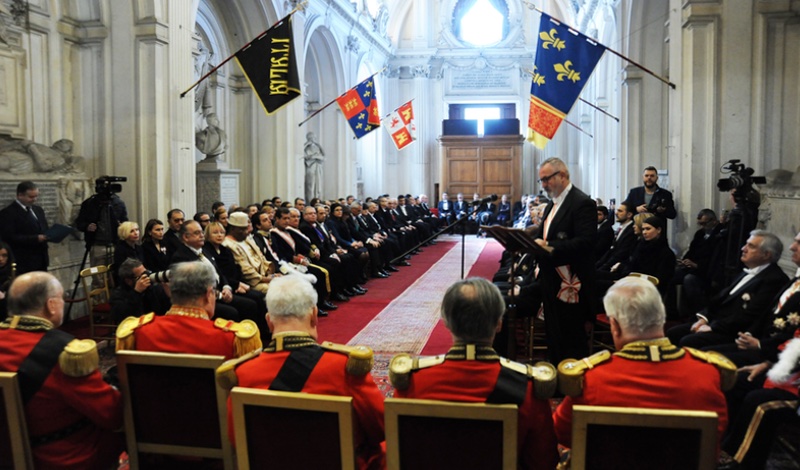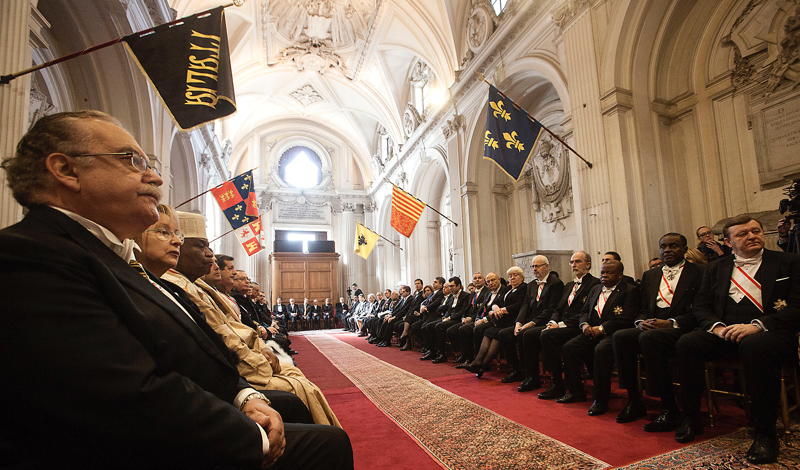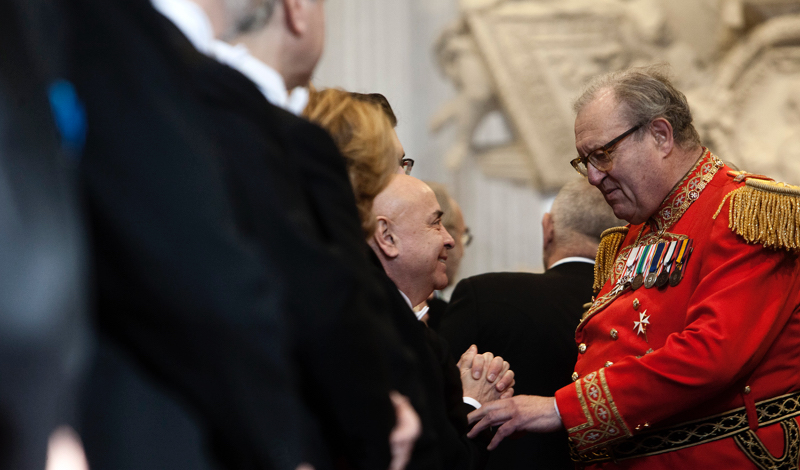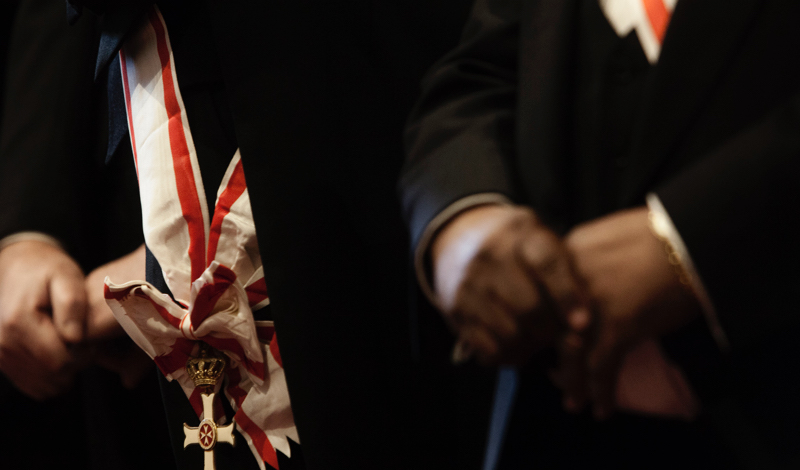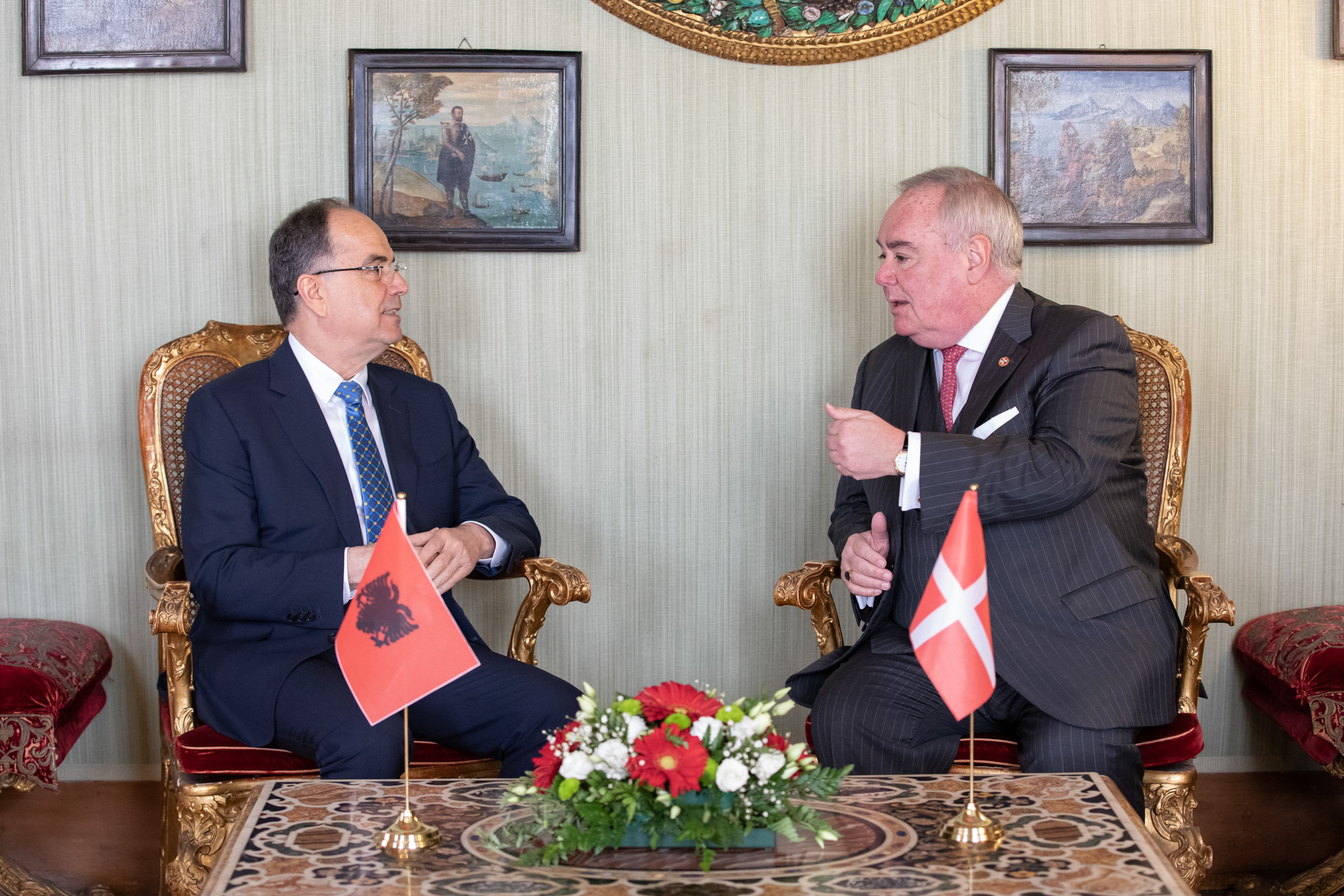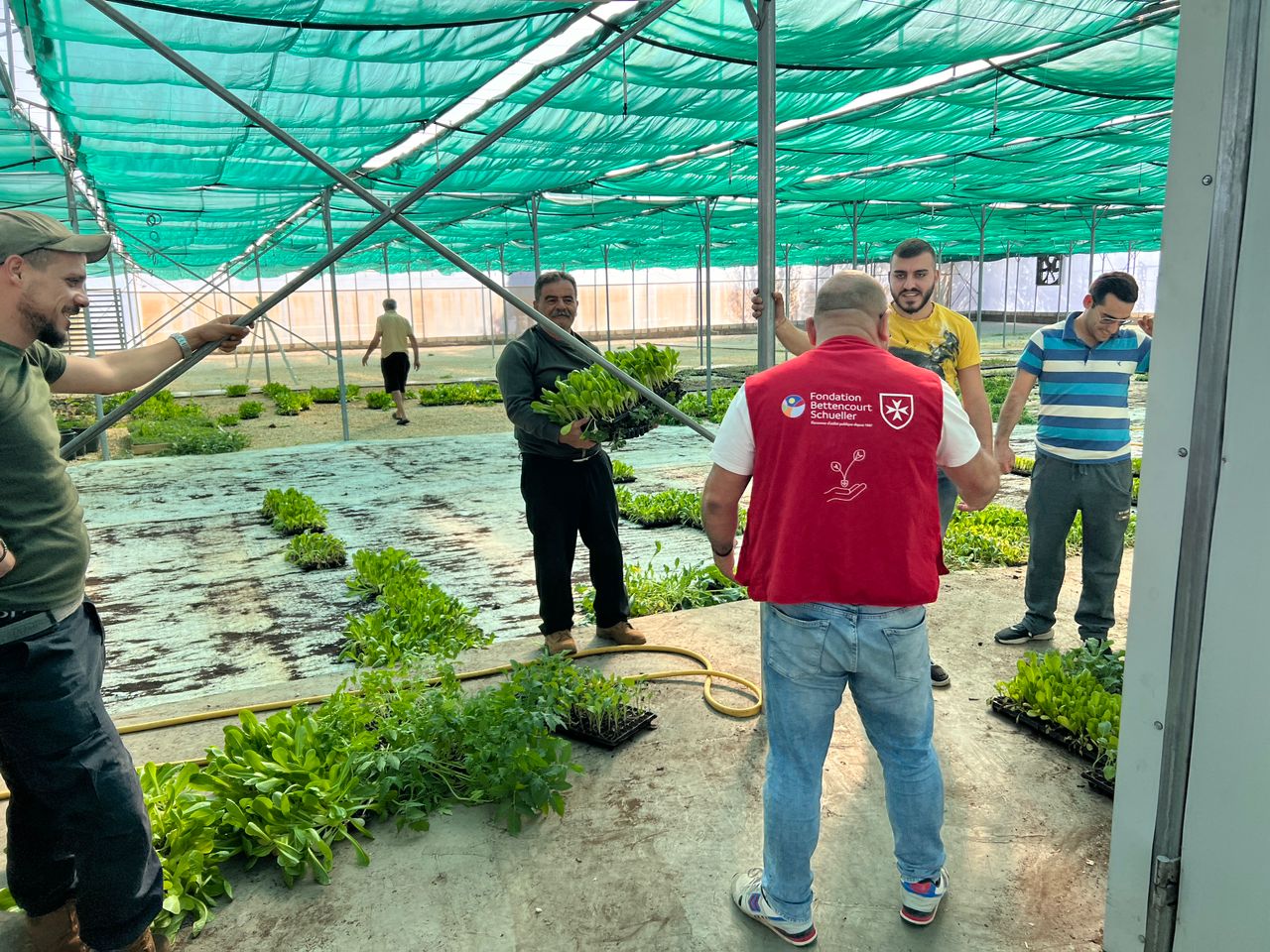The Grand Master Fra’ Matthew Festing received today the Diplomatic Corps accredited to the Sovereign Order of Malta for the traditional audience of the beginning of the new year. The audience took place at the Magistral Villa in Rome.
Here is the address of the Grand Master
Mr Doyen, Excellencies, Ladies and Gentlemen,
It is my pleasure to receive you here today at the Magistral Villa, for the traditional exchange of greetings at the start of this New Year. I wish to thank the Doyen of the Diplomatic Corps, the Ambassador of the Czech Republic, Pavel Vosalik, for his kind and significant words. I extend my best wishes to him and to you all, and in particular, to the Ambassadors who presented their credentials last year and are participating for the first time in this audience. I acknowledge the passing of the Cuban Ambassador and of the Ambassador from Liberia and recall their support and contributions with gratitude. We remember them in our prayers.
This joyous and traditional occasion for meeting you is set – yet again – against the backdrop of a deeply concerning international scenario. Dialogue, the basis of your mission, builds bridges of peace among peoples and governments. Today, those bridges, once steady, are beset by obstacles of fear and distrust, a bitter legacy of the new fundamentalist offensive in many parts of the world. As I wrote in the message of condolence I sent to President Hollande of France after the Paris attacks last November: “terrorism is an enemy of mankind and a threat for the entire international community.” During the Bataclan concert hall siege the Order of Malta answered the SOS from the Paris Prefecture and immediately sent 40 first-aiders and 8 vehicles to assist victims. From France to Mali, from the massacre at a disabled centre in California to war-torn Middle East, the dimensions of this conflict are increasing.
We live in an era of asymmetric conflicts, in which the warring parties – no longer nations but groups – reject the humanitarian conventions codified by states after centuries of atrocities. It is an era in which battlefields are replaced by attacks in schools, hospitals, theatres, public places – and the victims are more often innocent civilians rather than soldiers, forced to leave their homes, setting out on long and dangerous escape routes.
The collective odyssey of 60 million people worldwide – a true “nation in flight” – has become a distressing symbol of our times, creating an even more complex theatre of action for humanitarian agencies. The Sovereign Order of Malta has always stated that there can be no short-term solution to the problem, nor can it consist of walls or slogans. We must build bridges, not walls, as Pope Francis said recently: it is the lack of long-term political solutions that is leading to more protracted crises and unprecedented levels of displacement.
We make a call for action to reinforce the humanitarian principles stated in the post war Geneva Conventions. The European Union must work together to put in place a common policy and faster administrative procedures to manage this humanitarian crisis and recognise its core values: protecting lives, upholding human dignity and promoting tolerance. It is deplorable that refugees fleeing from the Syrian war are forced to reach Europe through life-threatening means.
Long-term plans and objectives are needed to tackle this challenge. However let us not forget that we are still talking about small figures, in comparison to other countries which have been hosting millions of refugees for years. Lebanon has the highest number of Syrian refugees, followed by Jordan where approximately one in ten people is a refugee, and although strained, these countries have not collapsed. It is crucial, indeed vital, that support be increased to the neighbouring countries of Syria, where conditions for refugees and local population are so dire.
Malteser International, our worldwide relief agency, is helping thousands of displaced people every day in Iraq, Turkey and Lebanon, providing assistance, mobile medical units and social care. In Lebanon, where one inhabitant in three is a refugee, the Lebanese Association delivers a range of support, with the added help of Malteser International. In the seas off the island of Lampedusa, doctors, nurses and rescuers of the Order’s Italian Relief Corps on the Italian vessels patrolling the Mediterranean, work daily to save thousands of desperate men, women and children. In October and November alone, 1,500 people were saved after floating adrift. The Order’s mission has in recent weeks extended its aid in the Aegean Sea, following the increased influx, and heart-rending deaths, of refugees en route to Greece.
During 2015, we also assisted refugees on the ‘Balkan route’, most of them Syrian. Our activities continue along the main refugee routes, with socio-medical assistance and integration programmes, active now for years in Germany and France, and more recently in Hungary and Austria. But the refugee crisis affects not only Europe, but also Central America and South East Asia.
This experience led to our attendance as Observer at the key summit on Migration in Valletta, Malta, in November, in which European and African states participated.
*****
As well as these humanitarian crises, there are epidemics and natural disasters in many parts of the world. For example, in Africa – Kenya, South Sudan, Ivory Coast, Cameroon and many other countries – the Order has developed clinical projects to combat Ebola, tuberculosis and AIDS. We also organise prevention campaigns, training for health workers, mobile medical teams, and the improvement of water and food supplies. We offer a wide range of social and community care too. For example, in 21 countries in Central and South America our flag flies above rest homes, day care clinics, centres for ‘street children’ and hospices for HIV mothers and infants.
While the international community studies how to reduce climate change effects, a significant cause of poverty worldwide, the Order of Malta is helping many communities to set up measures to allay these effects. In South East Asia, through Malteser International, we implement disaster-risk reduction programmes to combat flooding and landslides. In many projects, we encourage sustainable use of natural resources, such as forests and rivers, and the empowerment of local communities.
In major crises, we remain long after the attention of the international community has faded. The Doyen has spoken today of “stories that have disappeared from the front pages of newspapers and television screens, but where suffering continues”. It is precisely such stories that concern us. Let me take Nepal and the Philippine as examples. Eight months after Nepal’s devastating two earthquakes, political friction and environmental restrictions are further complicating a difficult situation. Malteser International’s aid workers have cleared rubble, fed and treated over 70,000 people and are still on site to provide medical, logistic and social assistance. The typhoon that struck the Philippines in 2013, destroying thousands of lives and homes, is also a forgotten media story. But for the Order of Malta, its consequences are still news. On the ruins we have built hundreds of new houses which have withstood new and violent weather conditions. I was able to see them for myself during my recent official visit and noted them in my talks with President Benigno Aquino.
In Asia we also provide care for the poor and the sick, especially leprosy victims. We support research in the gene therapy project for leprosy in Cambodia, Laos and Vietnam.
In other places, with the same dedication, our work addresses more conventional but no less pressing needs. In Cuba we distribute 750,000 meals a year to the poor, in Peru we bring medicines and treatment to the indigenous population in rural areas. From Europe to South America, dozens of rest homes, hospices, and centres for the disabled and for the elderly with mental afflictions, combine the ancient spirit of service with modern clinical treatment. In Bethlehem, our Holy Family Hospital has been a point of reference for 25 years for thousands of mothers, mostly non-Christian. And in our summer camps young enthusiasts – perhaps the volunteers of the future – learn, while having fun, the values of generosity and active love for others that will make them more sensitive human beings and better adults.
*****
Our spiritual dimension as a Catholic religious Order – the motivation behind who we are and what we do – is also to be lived and understood as a prayer that becomes a gesture and action for others. Such an example was our beloved late Grand Master Fra’ Andrew Bertie, whose Cause for Beatification was opened last February. The hearing of witnesses is now underway.
This religious element is the thread that connects the inner life of our members to the external action of our pilgrimages. Last year our members and volunteers from 42 nationalities took thousands of disabled or sick to Lourdes, and to other great Marian sanctuaries around the world. Recently our Ambassador for the Roma people led a group of 250 pilgrims from six countries on a pilgrimage to the Vatican, a testimony to the Order of Malta’s programmes for the integration of the Roma in society.
*****
This past year was marked in diplomatic terms by my visits to the Heads of State of Albania, Philippines, Malta, Republic of China – Taiwan, and the Kingdom of Spain. I was delighted to receive at the Magistral Palace the President of Lithuania, and the Director General of the United Nations, Vienna. I acknowledge, too, the many representatives of governments we received. And in November, we celebrated the establishment of diplomatic relations with Grenada. Over the next few weeks I will travel to meet the Presidents of El Salvador, Honduras and Panama. In Central America the Sovereign Order of Malta has recently become an extra-regional Observer to the Central American Integration System (SICA). This new role will enable our active participation in regional medical and social programmes, and to intervene effectively after natural disasters.
*****
The aim of the World Humanitarian Summit, launched by the Secretary General of the United Nations Ban Ki-moon, and which will take place in Istanbul in May, is to reform the humanitarian aid system. We organised a symposium ‘Religions Together for Humanitarian Action’ at the United Nations, Geneva last May. Its aim: to stress that the values of spirituality, when represented by a humanitarian institution, can give a powerful impulse to the fight against poverty, disease and war. An important outcome was the UN Secretariat’s decision to set up a side event during the World Humanitarian Summit Global Consultation, held in October in Geneva, in which several religious organisations took part. Its scope was to discuss the issues raised in our symposium. This has created a strong momentum in the UN, such that during the Istanbul Summit, a special event on the role of religion and Faith Based Organisations and Institutions in the field of humanitarian aid is currently being elaborated.
The incentives of religious-based organisations and institutions inspire highly motivated, self-financed, and politically independent action. The Order of Malta has a 900 year-old history of service to those in need, whoever they are and wherever they come from. We have a presence in 120 counties on five continents. Our diplomatic relations with 106 nations and 30 international organisations is the measure of our international status. Here in the Magistral Villa we organised a conference in October between the two Libyan authorities of Tobruk and Tripoli – a significant event. Representatives of the United Nations High Commissioner for Refugees and the Italian Ministry of Foreign Affairs also attended. The meeting was a success as both delegations discovered they had no disagreement on the issue of migration. They were grateful for the opportunity to express their viewpoints and stress the challenges they face, such as the booming people-trafficking trade and the need to strengthen humanitarian laws in the country. This example demonstrates how humanitarian diplomacy can promote dialogue and understanding between peoples.
Your Excellencies,
The greetings I send to you, your families and the nations you so worthily represent, are entwined this year with the themes and hopes of the Jubilee of Mercy, solemnly inaugurated by Pope Francis in December. I am proud that 2,500 of our volunteers, coming from many countries, will be offering their services. During the 12 months, they will be on duty at our first-aid posts in St. Peter’s and the other three great Roman basilicas. As Pope Francis wrote in his Bull of Indiction for this Extraordinary Holy year, mercy “is the fundamental law that dwells in the heart of every person (…) the bridge that connects God and man, opening our hearts to the hope of being loved forever despite our sinfulness.” From this perspective the Jubilee is a special time for a strong reaffirmation of Christian values. It is also an opportunity for renewed dialogue and cooperation among religions, and now more than ever with those who do not believe.
And so, dear Ambassadors, as you carry forth your commitment to your important missions, I offer each of you my very best wishes for 2016, that it will be rich in opportunities for human development and spiritual growth.
Fra’ Matthew Festing





